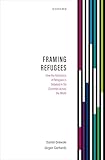Framing refugees : how the admission of refugees is debated in six countries around the world / Daniel Drewski, Jürgen Gerhards.
Publisher: New York : Oxford University Press, 2024Description: pages cmContent type:- text
- unmediated
- volume
- 9780198904724
| Item type | Current library | Status | Barcode | |
|---|---|---|---|---|
 Open Access Books - Publishers
Open Access Books - Publishers
|
National Law School | Available | OABP463 |
"Across the world, the number of people forcibly displaced from their homes has more than doubled during the last decade. Even though under international law, states are not allowed to turn back refugees, some countries close their borders and push back refugees, others open their borders and grant extensive protection, and yet others admit some groups of refugees while excluding others. How can we make sense of these different responses to admitting refugees? This book shows that governments' refugee policy, but also opposition parties' stance on the issue, depends very much on how they frame their countries' collective identity on the one hand and the identity and characteristics of the refugees on the other. By defining the "we" and the "others," politicians draw on cultural repertoires, which vary by country and political constituency within a country. For example, Turkey's open-door policy toward Syrian refugees under President Erdoğan becomes understandable only if one takes into account how Turkey's national identity is framed with reference to the Ottoman Empire and Islam. The restrictive policy of the conservative Polish government towards Syrian refugees becomes comprehensible only if one takes into account the definition of Polish identity with reference to Christianity and the fear of losing national sovereignty. The book is based on a discourse analysis of parliamentary debates. It explores the specific framing of nations' identities and the corresponding perceptions of otherness by focusing on six countries that have been confronted with large numbers of refugees: Germany, Poland, and Turkey, all responding to the exodus of Syrian and Middle Eastern refugees, Chile's reaction to the Venezuelan displacement, Singapore and its stance towards Rohingya refugees, and Uganda facing the displacement from South Sudan. The study not only looks at differences between governments of different countries but also differences between political parties within countries"-- Provided by publisher.
There are no comments on this title.
